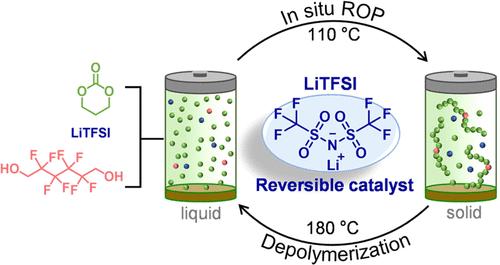Closed-Loop Recyclable Solid-State Polymer Electrolytes Enabled by Reversible Lithium Salt Catalysis
IF 14.4
1区 化学
Q1 CHEMISTRY, MULTIDISCIPLINARY
引用次数: 0
Abstract
The rapid expansion in lithium battery production and disposal presents considerable sustainability challenges, emphasizing the critical need for recycling. However, current methods predominantly focus on metals from cathodes, while electrolytes have rarely been recycled. Here, we propose an innovative closed-loop design for solid polymer electrolytes (SPEs), enabled by reversible catalysis of lithium bis(trifluoromethane) sulfonimide (LiTFSI) in both polymerization and depolymerization. The formation of a hydrogen-bonded adduct between TFSI– and alcohol initiates the in situ ring-opening polymerization of Li+-activated trimethylene carbonate (TMC), generating well-defined SPEs. With delicate structural optimization, the SPE achieves an outstanding ionic conductivity of 1.62 × 10–3 S cm–1 at room temperature with robust high-voltage stability up to 4.7 V. The assembled Li||NCM811 demonstrates promising cycling stability with 88% capacity retention over 100 cycles. Upon end-of-life, LiTFSI facilitates selective depolymerization of the polycarbonate-based SPE at 180 °C without introducing external catalysts, recovering both TMC monomer (>90%) and LiTFSI (>98%) for reuse. This work highlights a significant advance in closed-loop recyclable SPEs and a vital step toward sustainable lithium battery technology.

求助全文
约1分钟内获得全文
求助全文
来源期刊
CiteScore
24.40
自引率
6.00%
发文量
2398
审稿时长
1.6 months
期刊介绍:
The flagship journal of the American Chemical Society, known as the Journal of the American Chemical Society (JACS), has been a prestigious publication since its establishment in 1879. It holds a preeminent position in the field of chemistry and related interdisciplinary sciences. JACS is committed to disseminating cutting-edge research papers, covering a wide range of topics, and encompasses approximately 19,000 pages of Articles, Communications, and Perspectives annually. With a weekly publication frequency, JACS plays a vital role in advancing the field of chemistry by providing essential research.

 求助内容:
求助内容: 应助结果提醒方式:
应助结果提醒方式:


